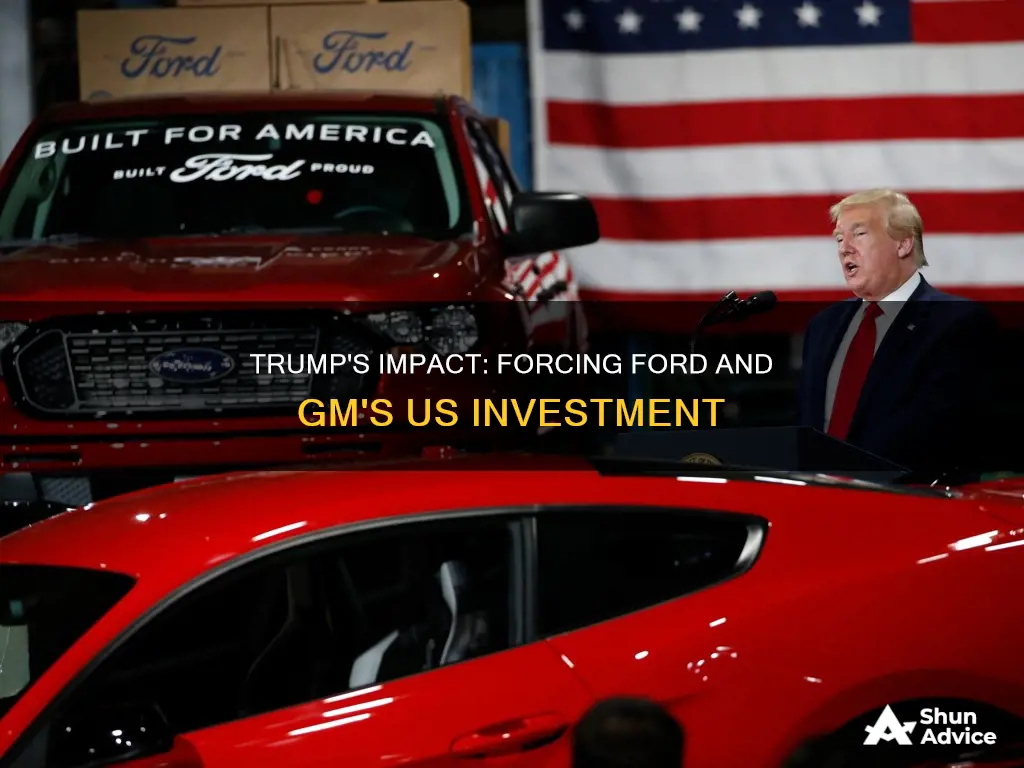
During his term, former US President Donald Trump pressured automakers, including Ford and General Motors, to increase their investments in domestic manufacturing and create more jobs in the United States. Trump frequently criticised Ford during his campaign, but their relationship improved when the company cancelled plans to build a $1.6 billion factory in Mexico in 2016. In 2017, Ford announced a $1.2 billion investment in three Michigan plants, which Trump promoted as a result of his administration's pro-growth policies. However, Ford clarified that the investment plan was originally negotiated with the United Auto Workers union in 2015, before Trump took office. Since then, Ford has made additional investments in the US, such as the production of electrified vehicles at the Flat Rock Assembly Plant.
What You'll Learn

Trump praised Ford's $1.2 billion investment in three Michigan plants
On March 28, 2017, President Donald Trump praised Ford Motor Co.'s $1.2 billion investment in three Michigan plants. The investment was announced by Ford in a tweet by Trump, who wrote: "Big announcement by Ford today. Major investment to be made in three Michigan plants. Car companies coming back to U.S. JOBS! JOBS! JOBS!".
The investment was planned before Trump took office and was part of contract negotiations with the United Auto Workers union in 2015. About $1 billion of Ford's spending will go towards engine and assembly plants for the Ranger and Bronco models, which will replace the production of slow-selling Focus compact cars. Another $200 million will be invested in a new advanced data center at Ford's factory in Flat Rock, Michigan, where the company has said it will add 700 jobs.
The investment in the Michigan Assembly Plant and the Romeo Engine Plant was in line with a previous agreement with the United Auto Workers union. In a statement, Ford said it plans to create or retain 130 jobs in its Romeo, Michigan, engine factory. Workers at its assembly plant in Wayne, Michigan, will start making the Ranger in 2018 and the Bronco in 2020.
While Ford's investments were not in response to Trump's demand for more auto jobs in Michigan, the company appreciated the attention the president was paying to its U.S. investments. Joe Hinrichs, Ford's president of the Americas, said: "It reinforces how important manufacturing jobs are in America and as the leading producer of vehicles in the U.S... We think it’s very consistent with the pro-growth initiatives that hopefully the White House and Congress will be able to bring forward to the economy.”
Trump's praise for Ford's investment came after a turnaround in their relationship, which occurred when the automaker canceled plans to build a $1.6 billion factory in Mexico in January. Trump had frequently criticized Ford during his campaign, but after the cancellation of the Mexico factory, he began to praise the company and chat regularly with Executive Chairman Bill Ford about trade, regulations, and taxes.
Understanding Investment's Role in Owner's Equity
You may want to see also

Ford's investment was planned before Trump took office
Ford's $1.2 billion investment in three Michigan plants was planned before Donald Trump took office. The investment was part of contract negotiations with the United Auto Workers Union in 2015, according to Joe Hinrichs, Ford's President of the Americas. Hinrichs noted that all three projects were in the works well before Trump took office, with the largest, involving an $850 million assembly plant investment, approved as part of the 2015 deal.
Hinrichs stressed that Ford is "encouraged by the pro-growth approach the administration is trying to follow." The investments are all part of a package that Ford presented to the state of Michigan, seeking about $30 million in tax abatements and other savings over the next 15 years. The projects will help save or add thousands of jobs in the suburban Detroit region, aligning with one of the president's priorities.
The largest project involves an $850 million investment in the Michigan Assembly Plant, located about 15 minutes west of the automaker's Detroit headquarters. The factory had been producing a mix of small cars, including the Ford Focus, which will now be moved to a plant in Mexico. This decision to move production to Mexico triggered the anger of then-candidate Donald Trump, who warned of a border tax to penalize Ford. However, Ford's decision was based on utilizing the Wayne plant to produce two new truck models: modern versions of the Bronco SUV and Ranger pickup. Analysts suggest that this strategy is more likely to retain and grow jobs in today's truck-centered US market.
The decision to put the Ranger and Bronco into the Michigan Assembly Plant was locked into place in the four-year contract that Ford signed with the United Auto Workers Union in late 2015. The only major development since then has been Ford's decision to increase its investment in the factory from $700 million to $850 million, reflecting optimism for the sales prospects of the two vehicles.
Shareholders' Equity: Does It Reflect Shareholder Investment?
You may want to see also

Trump pushed for US manufacturing and job creation
Trump's push for US manufacturing was evident in his criticism of Ford's plan to build a $1.6 billion factory in Mexico. He warned that he would enact a border tax to penalize Ford. However, Ford eventually scrapped these plans and, instead, added 700 jobs in Michigan, a decision praised by Trump.
Trump also took credit for Ford's $1.2 billion investment in three Michigan plants, which was expected to create or retain thousands of jobs. While this investment was planned before Trump took office, he still promoted it as evidence that he was helping the US economy and bringing manufacturing jobs back to the country.
Trump's administration pushed automakers and other companies to produce their products in the US, threatening backlash for companies that manufactured abroad and sold at home. This pressure led to several US jobs announcements by Ford, General Motors, and Fiat-Chrysler after Trump's election win, which he frequently touted, even if many of the projects were planned before his presidency.
A Guide to Investing in Indian REITs with Zerodha
You may want to see also

Trump threatened to enact a border tax to penalize Ford
During his 2016 presidential campaign, Donald Trump frequently criticized Ford. However, their relationship improved when, in January 2017, Ford cancelled plans to build a $1.6 billion factory in Mexico. In March 2017, Ford announced it would invest $1.2 billion in three Michigan factories, a move praised by Trump. However, this investment had been planned in 2015 as part of contract negotiations with the United Auto Workers union.
Trump's praise for Ford came in contrast to his criticism of the company during his campaign. As a candidate, he had warned that he would enact a border tax to penalize Ford for moving small car production to Mexico. In a series of tweets, Trump threatened several companies, including Ford, with a "big border tax" if they expanded manufacturing facilities abroad for products to be sold in the US.
While the details of Trump's proposed "big border tax" were unclear, experts debated whether he was referring to a tax or a tariff. Trump stated that US companies that shut down domestic manufacturing plants and laid off workers, only to open new facilities abroad, would pay a 35% tax or tariff on products shipped back to the US market. However, it is important to note that the US president does not have the unilateral power to impose taxes, as Congress writes the tax laws. Any attempt by Trump to impose a tariff unilaterally would likely face legal challenges.
Trump's threat of a "big border tax" caused anxiety in business circles, and some experts believed it hinted at a special penalty tax for companies that outsourced jobs overseas. This was in contrast to a House Republican proposal, known as border adjustability, which would treat all imported products equally, regardless of whether the company was US or foreign-owned. The proposal aimed to attract investment, provide incentives for manufacturers to maintain or expand US facilities, and dissuade companies from leaving the country.
Creating Your First Investment Portfolio: A Beginner's Guide
You may want to see also

Trump gave Ford, GM, and Tesla the go-ahead to make ventilators
During the COVID-19 pandemic, then-President Donald Trump gave Ford, General Motors (GM), and Tesla the go-ahead to produce ventilators. This was a notable move, as Trump had a somewhat fraught relationship with the US auto industry during his first term in office, particularly with Detroit carmakers. There were disagreements over labour, trade, tariffs, and regulations.
However, in March 2020, as the pandemic was taking hold, Trump invoked the Defense Production Act, which gave him the power to require companies to prioritize the production of critical equipment, including ventilators. This was a significant shift in policy, as the US had previously relied on market forces to shape the production of essential goods.
Ford, GM, and Tesla stepped up to the challenge, leveraging their manufacturing capabilities and expertise to produce ventilators. This was a crucial contribution to the national effort to combat the virus, as ventilators were in high demand due to the respiratory nature of COVID-19.
In addition to ventilator production, Trump also encouraged US automakers to invest in domestic manufacturing and job creation. In March 2017, Trump urged Ford, GM, and Fiat Chrysler Automobiles to boost employment and bring jobs back to the US. This was in line with his focus on strengthening the American auto industry and his criticism of Ford's previous plans to build a factory in Mexico.
While Ford's $1.2 billion investment in three Michigan plants was actually planned in 2015, as part of contract negotiations with the United Auto Workers union, Trump was quick to take credit for it. This investment was expected to save or add thousands of jobs in the Detroit region, aligning with Trump's priority of creating and retaining American jobs.
Your Portfolio Investment: What's Inside Matters
You may want to see also
Frequently asked questions
Ford Motor Co. announced in 2017 that it would invest $1.2 billion in three Michigan factories, a move that was previewed in a tweet by President Donald Trump. However, Ford stated that the investment was planned in 2015, before Trump took office, as part of contract negotiations with the United Auto Workers union.
No, there is no evidence that Trump made GM invest in the US. However, during the COVID-19 outbreak in 2020, Trump gave GM, along with Ford and Tesla, the go-ahead to produce ventilators and other metal products.
Yes, Ford and GM made US investment announcements after Trump won the 2016 presidential election. However, many of these projects were in the works before Trump's election.
Yes, Trump and his administration took credit for Ford's investment, with Trump tweeting about it before the official announcement. However, Ford executives stressed that the investment was planned before Trump took office.
During his first term, Trump had a contentious relationship with the US auto industry over regulations, trade agreements, and tariffs. After speaking with Trump at length, Ford Motor Co. Chairman Bill Ford expressed optimism about Trump's approach to the auto industry in his second term, believing that Trump wanted to strengthen the industry and help its workers.







